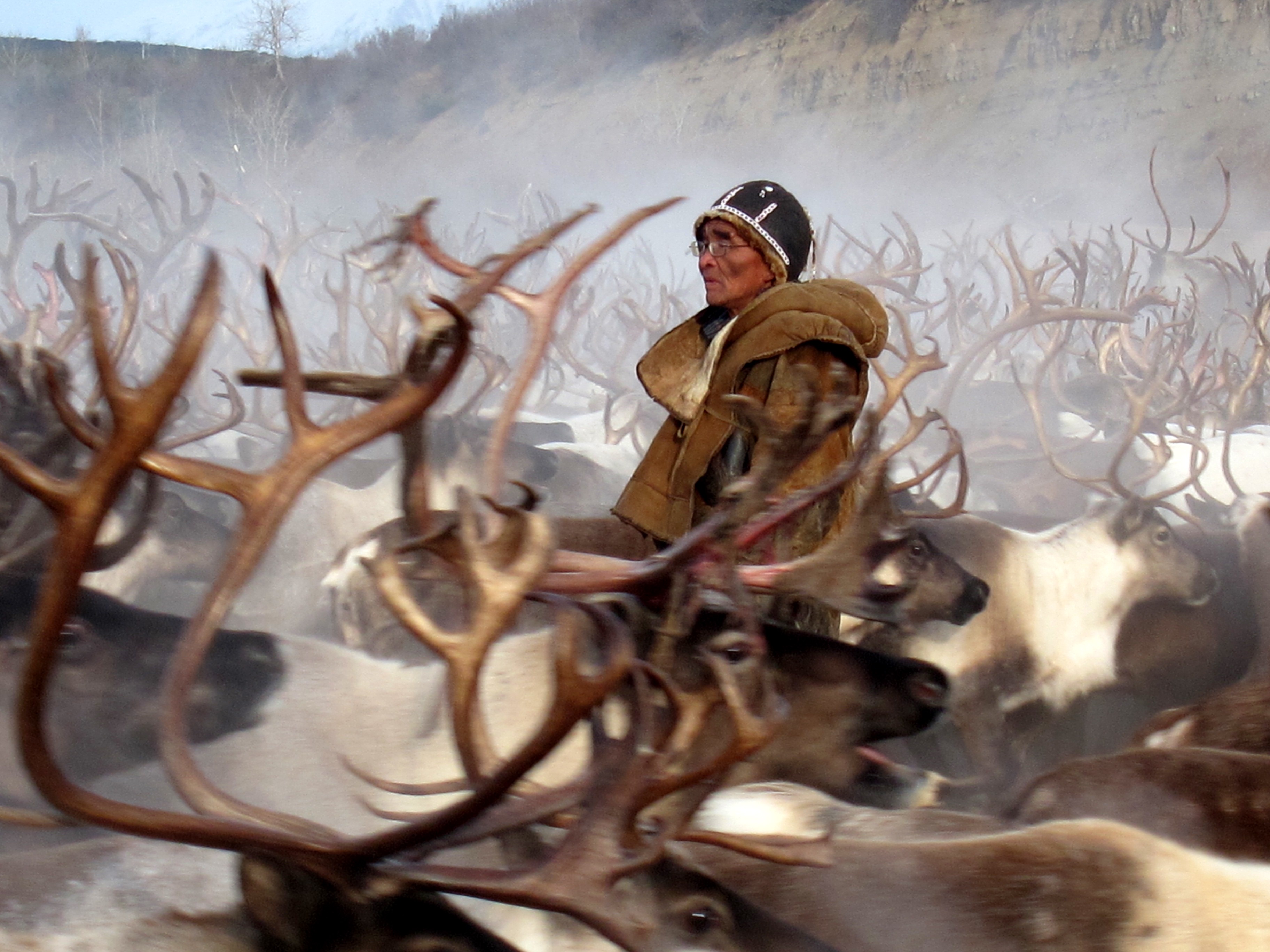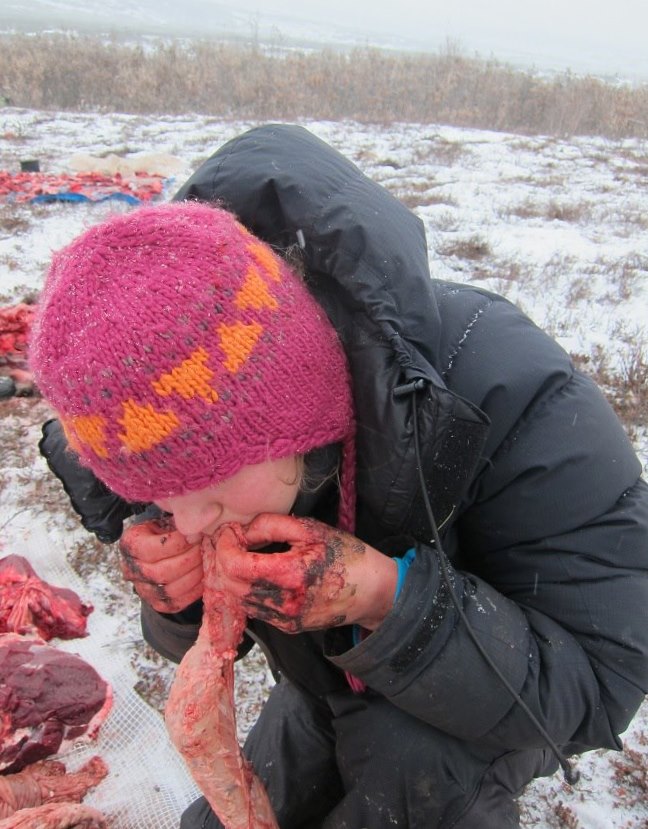The ancestors within you
Who am I? From whom have I inherited my personality? We often have difficulty understanding our complex personality traits and seek answers from coaches, psychologists and psychotherapists like never before. Anthropologist Jeanette Lykkegård has lived on the Siberian tundra among the Chukchi who have an interesting understanding of the cycle of life and of our complex personal identity.


The women are cleaning reindeer intestines. That's their job. Anthropologist Jeanette Lykkegård is sitting on the Siberian tundra in 17-degrees frost and is working hard to clean the intestines. Her fingers are becoming more and more numb with cold, and she is thinking only of how good it will be to wash her hands in the warm blood from the slaughter. This is an ordinary day for Jeanette who has chosen to engage fully in the life of the Chukchi to become part of their community and understand their world.
"You came home again." Kisses and warm hugs meet Jeanette as she once again gets out of the helicopter in Achaivayam where most of the village people have gathered at the heliport.
"The third time I came back to Achaivayam one of the women shouted to my Chukchi mother: ‘See, your daughter has finally come.’ I knew then that I was fully accepted and that it is not only me who feels that Achaivayam is my second home," says Jeanette, who is working on a ph.d. thesis on the Chukchi.
I am my ancestor
Who am I? What has created my personality? For the Chukchi the answer is straightforward. This indigenous people living by herding reindeer in north-eastern Siberia live a life where the past and the present are closely linked, and where there is a well-defined self-understanding: I AM my ancestors.
The connection to the ancestors is palpable. All Chukchi have their own Gihr-gihr, a wooden figure that symbolises their person and at the same time is a physical manifestation of the ancestors. The coarse wooden figure carries many amulets representing their children, and for every death among friends and family another knot is tied on the thick leather straps that are fixed to the wooden figure. In this way the Gihr-gihr connects the person with the living and the dead relatives and friends who are part of life.
"The Chukchi have a circular view of life. When one dies, the soul travels to the ancestral world and then comes back in a new person through rebirth. Dreams or rituals tell who will be reborn in the newborn child and the child will have the same name as the ancestor or ancestors. It is important that the child is named correctly from the souls they have inherited - otherwise the child may fall seriously ill," says Jeanette.
A person may be the reincarnation of up to five ancestors at one time and up to five living persons may be the reincarnation of the same ancestor. Thus, the ancestors live in you and help shaping you.
You are your actions
In Denmark we have a personality that leads us to act in certain ways, but the Chukchi perceive the individual in a different way. Here, you are your actions. The action comes first and forms the person because even though you are your ancestors, your actions change who and what you are. For the Chukchi it is very important to be aware of one’s actions and act clearly and strongly so as not to disappear and end up living ‘ushe nemnoska umer’ – ‘already a little bit dead’ - indifference and lack of commitment and initiative are the same as being a little bit dead for the Chukchi.
"If the elderly find that a young person becomes weak by not living as a Chukchi or Russian, and thus is a little bit dead, they are sent out on the tundra to learn to live. On the tundra, they grow more alive and obtain some of the skills that enable them to live as a Chukchi. They return as a stronger person," says Jeanette.
The indigenous Chukchi people have lived on the tundra for thousands of years, and only 100 years ago they virtually all lived in tents and followed the reindeers’ migration. However, during the Soviet rule the Chukchi were forced to adopt a Russian lifestyle where their religious beliefs were banned. They were moved into small villages with schools, central heating, western products and hospitals. But as the only one of the small indigenous peoples, the Chukchi did not convert to Christianity.
This was strongly felt in the village when Marina wanted to name her son Nikita, a popular Russian name. The young woman would not listen to her mother's tale of rebirth and that her son should be named after Marina's late father and grandmother as she had learnt at school that reincarnation is superstition. However, when she fell seriously ill she changed her mind. In a dream her father healed her to come back to her through her son, and the baby was then named Kataurgin after her father.
The Chukchi are now villagers and part-time nomads but still feel that ‘they are nothing without reindeer’. Many older Chukchi accept that the time might be running out for the Chukchi. Therefore, they do not stop the young people from living a Russian way of life. Rather they encourage them to take the plunge fully and get an education and live outside the Chukchi community where this way of living is a real possibility. The elders believe that it is important to choose to live as one or the other and to know who you are, so you do not end up living ‘ushe nemnoska umer’.
Greetings from a dead man
The thickest tree trunks that the villagers could find are stacked into a one metre high funeral pyre on the sacred hill ‘Sjamanka’ just outside the village. On the funeral pyre lies Vasja clad in his funeral suit that is made of reindeer skin from his own reindeer herd. Two men attend to the fire. There is smoke in the air and the flames catch on to the reindeer clothes.
The funeral crowd sits with their backs against the fire and listens to the song sung by a single woman to help Vasja on his journey. Only the elderly women from the village are allowed to look at the fire. But Jeanette cannot resist peeking. Now and then she turns her head and she sees the same as the elders – just before the flames get hold of Vasja, he slowly bends his left arm in a last farewell.
It was Vasja’s sister who found him dead. All agree that it was the alcohol that took his life. And alcohol is one of the main reasons for conflict between the Russian lifestyle and the Chukchi view of the world.
His death caused anger to flare up in Achaivayam against the alcohol and those who sell it in the days between Vasja’s death and his farewell. But Vasja’s last greeting from the funeral pyre changed something. Vasja gave a sign. And the older women know what it means. Vasja told them that he was to blame for his own death. It put a lid on the anger and sparked discussions on young people's lack of knowledge about how to live and act in a world full of spirits.
The older women are trying to get Jeanette to understand: Everything in the world is alive and has its own will, even alcohol. A life in accordance with your own wishes requires protection against and demarcation from the will of all the other beings and things. The older women explain that many of the young people do not know how to do this. They are weak and can easily be taken over by the strong will of alcohol. The women say that Vasja’s last message shows that he blames himself that he was not able to act in accordance with his reincarnated ancestors. He did not live purposefully and did not follow the ‘ancestors within him’, and this eventually led to his death.
